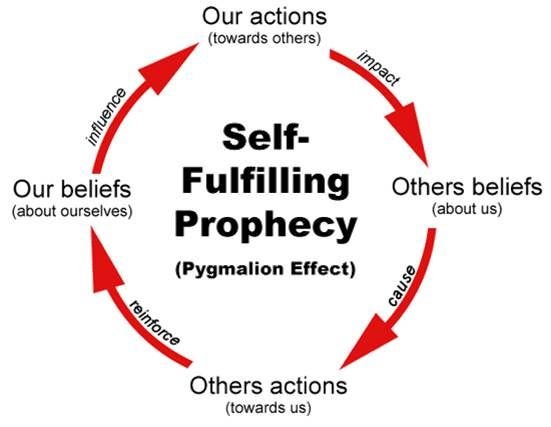
“Think twice before you speak, because your words and influence will plant the seed of either success or failure in the mind of another.” — Napoleon Hill
The Golem effect is a psychological phenomenon in which lower expectations are placed upon a person either by their supervisors or even by the person themselves. These lower expectations eventually lead to poorer performance by the person.

The term “golem” comes from Jewish folklore and appears in the Bible. A golem is an animated being usually created from clay. The term was used to denote amorphous, unformed material.
Hold in your mind for a moment that thought of an unformed being. Think about how the words you use around people can be so influential. For example, a parent I know consistently tells everyone how their child is a disaster. They say these words in front of their child. I avoid this parent as I can feel their words chipping away at the child’s confidence. Their words are influencing that child’s future state.
We are greatly influenced — whether we like it or not — by those closest to us, by the information we feed our minds, by the thoughts we think. What we feed our minds and what we let others feed our minds greatly shapes what we become in life.
With the golem effect, if you tell a child they are bad at something, they will begin to believe it and eventually, they will become it. Likewise, when it comes to a business, how people talk about a business and indeed how they think about it can have a major impact on performance.
The following phrases are very common in businesses:
“Nothing will ever change around here!”
“This place? We will never innovate!”
“The problem with this place is the people!”
This is the focus of today’s Thursday Thought.
The Pygmalion Effect
In Greek Mythology, Pygmalion is a sculptor who makes a statue so beautiful that he falls in love with it. Pygmalion prays to the goddess of love, Aphrodite to give him a wife just like his statue. Aphrodite grants his wish and brings his statue to life.
The Pygmalion effect is a form of self-fulfilling prophecy — like the Golem effect — where a strongly held belief or delusion may sufficiently influence people so that their reactions ultimately fulfil the once-false prophecy. Essentially, people are “cast in roles” and pigeon-holed. We see this in sports all the time, a coach is told young John is a great defender and indeed his older brother is also a great defender, then the coach looks for confirmation to qualify that John is a great defender. First, an assumption is cast, then confirmation bias kicks in to qualify that assumption. You can see how it works as follows:
The Pygmalion Effect in Business
The Pygmalion effect is also known as the Rosenthal effect, named after a famous psychological experiment called “Pygmalion in the Classroom”. In Robert Rosenthal and Lenore Jacobson’s study, when teachers were led to expect enhanced performance from certain children, then those children’s performance was enhanced. “Rosenthal argued that if teachers’ expectations about student ability are manipulated early, those expectations will carry over to affect teacher behaviour, which in turn will influence how the students will perform on an IQ test. Inducing high expectations in teachers will lead to high levels of IQ test performance. Inducing low expectations will lead to low IQ test performance.”
Like a teacher, when a sports coach looks for good traits in his players, he will find those good in those players. Equally, if he is looking for failings, he will find them also.
When a business leader thinks positively of her people and reinforces the good work those people do, they will be more engaged and committed to their roles and the business will ultimately benefit. Unfortunately, many leaders are isolated from their people and do not get to communicate the good that those people do. We discussed the importance of vision and corporate storytelling on this blog many times. With the Golem Effect and the Pygmalion Effect, we can understand further why these elements are so vitally important.
Business leaders must remind people why they do what they do every day. These reminders come from messaging, storytelling and behaviours. Every opportunity to influence people must be seized. Thoughts influence actions, which influence behaviours, which reinforce thoughts, which lead to more actions.
Belief in our children, belief in our people, belief in our players has an immense impact on their performance. The language we use around people has a huge impact on their behaviour. The thoughts we ignite in people, including ourselves ultimately impact who we become.
“Our life is shaped by our mind; we become what we think. Suffering follows an evil thought as the wheels of a cart follow the oxen that draws it. Our life is shaped by our mind; we become what we think. Joy follows a pure thought like a shadow that never leaves.” ― Gautama Buddha
This week’s innovation show is EP 137: “The Positive Potential of Marijuana and CBD with Sebastián Marincolo PhD”
“The legalisation of marijuana is not a dangerous experiment — the prohibition is the experiment, and it has failed dramatically, with millions of victims all around the world.” ― Sebastián Marincolo
The work today’s guests is based on a vast body of knowledge and represents a new methodology for researching the potential of the marijuana high. It is informed by the philosophy of mind, the cognitive sciences, psychology, chemistry, neurobiology and a systematic analysis of hundreds of anecdotal reports. It blends hard science with the warmth of human experience and a deep appreciation for the complexity of human consciousness.
While medical cannabis is capturing most of the attention at the moment, the vast majority of users — an estimated 85% — are interested in the high; first and foremost.
Our guest wants to know how the high can spur creative thinking, deepen empathic understanding, help with many illnesses, enhance the ways we pay attention, or bring hidden memories to the fore. Cannabis has always been able to do some of these things, Rather than dwelling on the supposed dangers of cannabis — none of which have ever been proven — he’s asking a far more intriguing question: How can we use it to enhance our existence?
Prohibition prevents independent, expert information on cannabis biology, strains, genetics and growing from entering the mainstream media. Furthermore, many users have even been actively misled by criminal dealers who take advantage of prohibition and the lack of knowledge on the side of consumers to sell them cheaply produced, low-grade marijuana — sometimes laced and weighted with dangerous substances — under the name of superior strains.
It is for these reasons we welcome today’s guest: philosopher, consciousness researcher, creative director, photographer and author of “High — insights on Marijuana” and “What Hashish Did To Walter Benjamin” Sebastian Marincolo PhD.
We talk:
The Science behind Marijuana and CBD
The Endocannabinoid System
CBD
Prohibition
Legalisation
The impact on health
Autism
Empathy
Creativity
Imagination
Hyperfocus
Memory Retrieval
Pattern Recognition
Focused Attention
Alzheimer’s
Parkinsons
PTSD
Anxiety
How to get high properly,
Vaping vs smoking and much more
Have a listen:
Have a listen:
Soundcloud https://lnkd.in/gBbTTuF
Spotify http://spoti.fi/2rXnAF4
iTunes https://apple.co/2gFvFbO
Tunein http://bit.ly/2rRwDad
More about Sebastian here: http://www.sebastianmarincolo.de/
